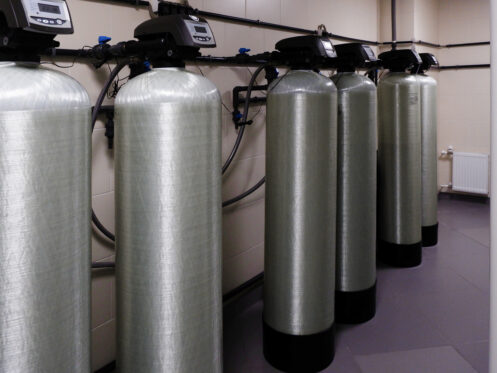Although you may not be aware of it, hard water is a common problem in homes here in Greensboro, NC. However, not every homeowner knows how to recognize the symptoms of hard water, and even fewer know that there’s a simple solution for it. By installing a water softener in your home, you can remove some of the mineral content in your water to keep it within a more acceptable range. Here are six ways that you can tell if your home needs a water softener and how they work to solve your hard water problems.
1. Have Your Water Tested
The simplest way to figure out if your home needs a water softener is to have your water professionally tested for hardness. This involves taking a sample of your home’s water and measuring the amount of calcium carbonate that’s dissolved in it. If your result indicates 121 mg/L or more of calcium carbonate in your home’s water, it would probably be a good idea to have a water softener installed in your residence. In most cases, you can expect the results from a professional water test within a week or two of submitting your water sample.
Although it will be less accurate, you can also perform a simple water hardness test yourself using common household items. To do it, fill a clean plastic bottle with water from one of your home’s faucets up to about one-third full. Then, add a few drops of liquid Castille soap, cap the bottle, and shake it for around 15 seconds. If your home has hard water, you shouldn’t see many soap bubbles forming in the bottle. Instead, the water will appear cloudy and won’t clear up as the water sits.
If you choose to perform the test above, it is important to use Castille soap or another soap that has no added detergents or rinse agents. Those additives work to help the soap form suds even in hard water, making the soap useless for this test.
2. Look for Fixture Staining
Even without a professional water test, there are ways to tell if your home has hard water. One of them is to look for the presence of stains on and around your home’s water fixtures. Hard water will often leave white or rust-colored stains around your drains and sinks. If you see those anywhere in your home, you probably need a water softener.
3. Check Your Utility Bills
If your residence has either an electric or gas-powered water heater, your utility bills might alert you to the presence of hard water in your home. As hard water passes through your home’s pipes, it leaves scale buildup in its wake. That will reduce your water heater’s efficiency and make it harder for it to do its job. It will even reduce the capacity of a storage-tank water heater over time, causing you to run out of hot water faster than you should.
4. Check Your Faucets for Scale
Scale buildup from hard water won’t just happen inside your home’s pipes. It will also show up on all of your home’s faucets. It will look like a crusty white accumulation that’s difficult to remove with ordinary cleaning materials. It can also show up as a white film on your dishes, glasses, and pots after you wash them. Worse still, it can also get inside your dishwasher and washing machine, significantly shortening their life spans.
5. Examine Your Laundry
Hard water also makes laundry detergent less effective and won’t rinse the product out of your clothes as well as it should. As a result, clothes washed in hard water will often appear gray or faded. They may also develop a sour smell and feel rough and scratchy when they come out of the wash. The fabric of your clothing will also wear out faster than it otherwise would. If you spot your laundry exhibiting any of these symptoms, your home may need a water softener.
6. Note an Outbreak of Dry, Itchy Skin
Hard water isn’t just bad for your laundry. It’s bad for your skin as well. The mineral content in your water could lead to dry skin and itchiness for everyone who showers in your household. Plus, hard water won’t rinse soaps away well, which could leave you vulnerable to outbreaks of blackheads and pimples. If any of those things are happening to the people in your household, a water softener could be the solution to the problem.
How a Water Softener Works
Most water softeners get installed in your home right where your main water supply enters. Typically, a water softener relies on the principle of ion exchange to remove dissolved calcium from your incoming water. To do it, water softeners have a tank filled with resin beads, which attract sodium ions from a connected tank filled with salt or a brine solution.
Then, as the incoming water passes through the resin beads, the positively charged beads attract the negatively charged calcium ions in the water. That allows the beads to trap the calcium and release sodium ions into your water in their place. The salt tank resets the beads so they can perform the process again and again.
As a result of the water-softening process, you’ll end up with softer water that has a slightly higher sodium content. For most people, the sodium won’t present any health issues, and it’s undetectable in terms of your water’s taste. However, people with heart troubles or those who require low-sodium diets may not want to drink the water that comes from a water-softening system.
If anyone in your home fits that description, you can always install a whole-house water filtration system to remove the sodium from your water after it passes through the water softener. In tandem, the two systems will produce water that’s precisely balanced and without any unhealthy components like chlorine, bacteria, and other harmful substances.
Your Local Water Softener Specialists
If you believe that your home could benefit from having a water softener installed, our team at Aurora Pro Services Heating, Air, Plumbing, Electrical, & Roofing is the resource to trust. We offer comprehensive plumbing solutions, including the installation of water softener systems and whole-house water filtration systems. We provide expert electrical and roofing services as well. Plus, we can see to all your HVAC installation, repair, and maintenance. We’re a one-stop shop for all of your home’s infrastructure needs, and you can always count on us to offer quality workmanship at affordable prices. However, you don’t have to accept our word for it. Just take a look at our long list of five-star customer reviews from residents of Greensboro like you. We get those reviews because we treat every customer like family, and that means treating them the same way we’d want our own family to be treated.
So, if you need a water softener to solve your Greensboro home’s hard water problems, call today to discuss it with our experts at Aurora Pro Services Heating, Air, Plumbing, Electrical, & Roofing.






